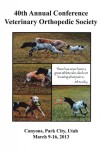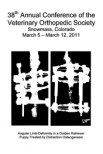Objective: To report the locoregional anesthesia and analgesia preferences of veterinary anesthesiologists for use in dogs undergoing a TPLO and determine any association with specialty college, time from board-certification, or employment sector.
Study design: Cross sectional study.
Sample population: Diplomates of the American (ACVAA) and European (ECVAA) Colleges of Veterinary Anesthesia and Analgesia.
Methods: An electronic survey was distributed to diplomates and responses were used to determine associations between preferred methods.
Results: The survey response rate was 28% (141/500) with 69% (97/141) of ACVAA diplomates and 31% of diplomates with ECVAA (44/141) certification. Peripheral nerve block (PNB) was preferred by 79% (111/141) of all diplomates, lumbosacral epidural (LE) by 21% (29/141), and peri-incisional infiltration (PI) by <1% (1/141). There was no association (p = .283) with specialty college. There was an association (p < .001) with time from board-certification with increased preference for LE when >10-years from certification and PI preferred by only those board-certified >20-years ago. There was an association with employment sector (p = .003) with more academic diplomates preferring LE. Anesthesiologists reported that treatment decisions were affected by various factors including time pressure and surgeon influence.
Conclusion: Diplomates of ACVAA and ECVAA prefer PNB as the locoregional method of pelvic limb anesthesia in dogs undergoing TPLO. A greater percentage of newer and private practice diplomates prefer PNB while a larger percentage of senior and academic diplomates prefer LE. Decision making is multifactorial and includes perceived time pressure and surgeon influence.
Clinical significance: Veterinary anesthesiologists prefer and frequently use PNB in dogs undergoing TPLO and surgeon influence may affect their chosen treatment.









